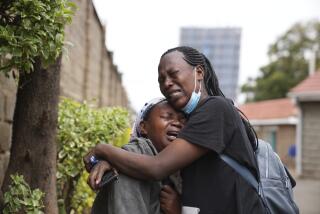Killing Kenya
Melitus Mugabe Were was a rarity among Kenyan politicians, a moderate who straddled the divides rending the country. A freshman lawmaker in parliament, he was a man who could have mediated between extremists in both the ruling party and the opposition, those who are fueling the violence that has left about 800 people dead in the past month and wrecked the infrastructure that turned Kenya into one of Africa’s most promising and prosperous democracies.
He could have, that is, if thugs hadn’t pulled up beside his Mercedes as he stopped at the gate in front of his Nairobi home last week, dragged him out of his car and pumped bullets into his eye and heart. He had just turned 39.
Kenya’s problems have roots that go much deeper than a spat between rival parties. When President Mwai Kibaki was reelected Dec. 27 in a tally riddled with fraud and other irregularities, it touched off a tribal and class conflict that had been simmering for years. Kibaki is a member of the dominant Kikuyu tribe, which makes up about 22% of the population but enjoys a disproportionate share of the country’s land, wealth and political power. The other 40-odd tribes have long resented the Kikuyu, especially the Kalenjin and Luo, who feel they were victimized by an unequal land distribution policy during the colonial period that benefited the Kikuyu. Opposition party leader Raila Odinga is a Luo (as was the father of Democratic presidential candidate Barack Obama, prompting Odinga to complain that Americans would elect a Luo president before Kenyans would).
Were was a member of the Luhya tribefrom Odinga’s opposition party. Yet he rejected the tribal politics that have prompted other Kenyan leaders, including both Kibaki and Odinga, to incite their followers to further violence, telling supporters not to join in the ongoing protests of the election results. A successful, Italian-educated entrepreneur who built a small soccer stadium in the Nairobi slum where he was born and founded a home for AIDS orphans, he was married to a Kikuyu woman and seemed a living embodiment of a future when ethnicity would cease to define Kenyans. Ironically, his murder was used to promote yet more violence, with Odinga implying that the killing was a political assassination by his adversaries. At least seven people died in the subsequent riots; the slaying of another opposition lawmaker two days later sparked more uprisings.
One of the tragedies of a deeply divided society like Kenya’s is that when the shooting starts, the peacemakers and moderates are often the first to fall. Kibaki and Odinga have both amply demonstrated that they’re unfit to run the country, but for now, its best hope is that they can agree to some sort of power-sharing arrangement. In Kenya’s immature democracy, the demagogues are in charge; someday they’ll give way to people more like Were. If any survive.
More to Read
Sign up for Essential California
The most important California stories and recommendations in your inbox every morning.
You may occasionally receive promotional content from the Los Angeles Times.










